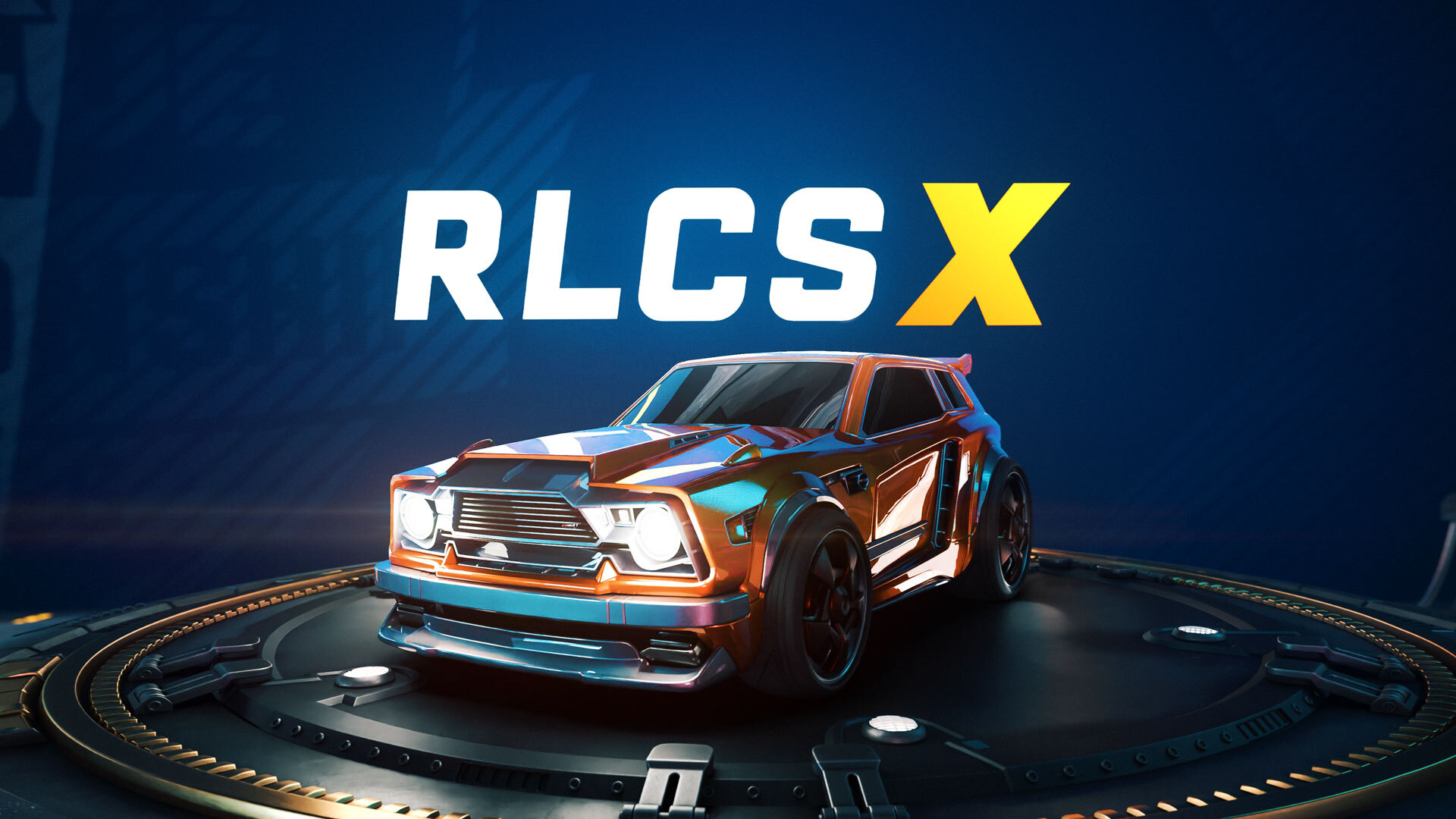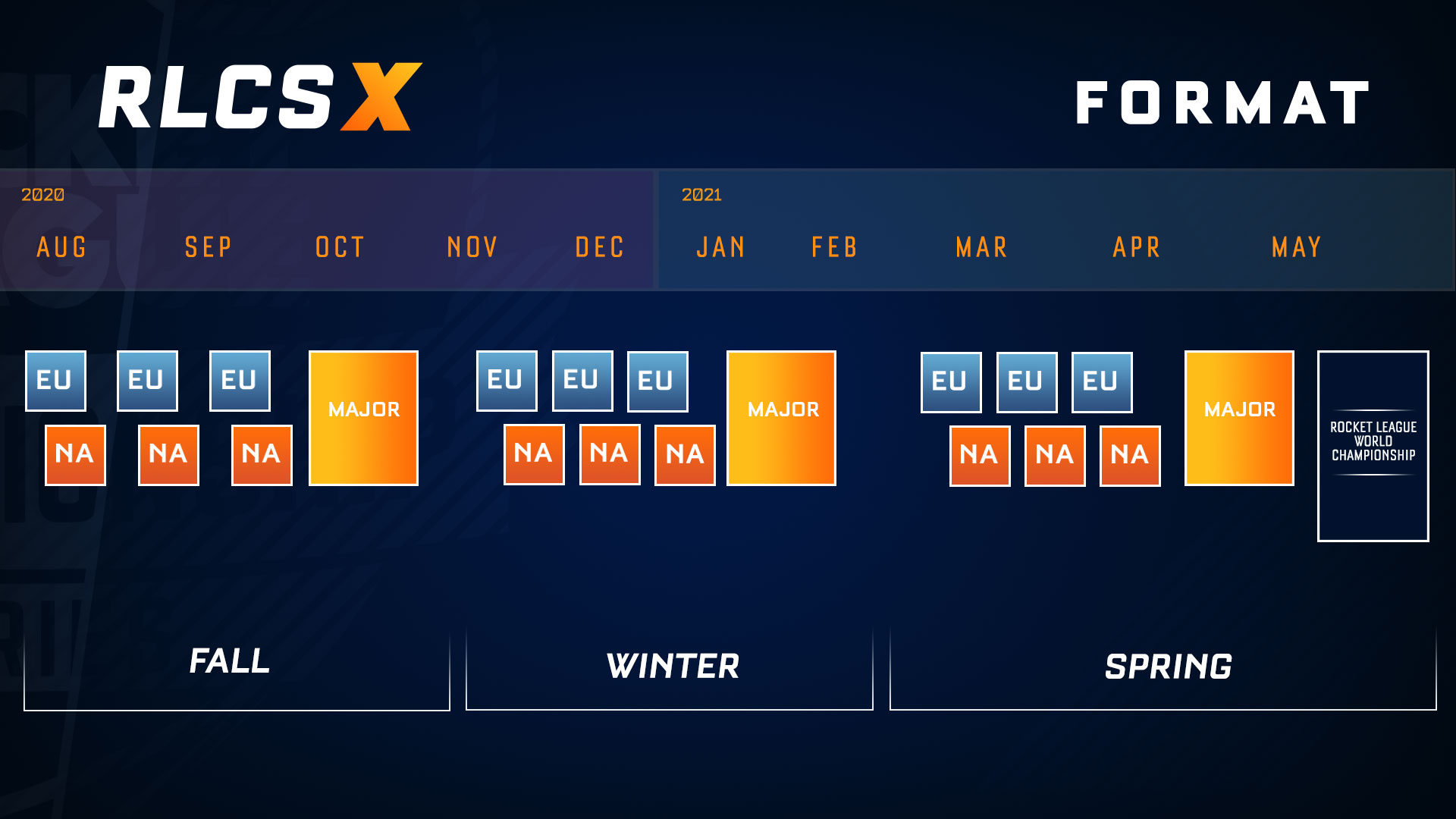After nine seasons and more than four years of steady growth and expansion, the Rocket League Championship Series (RLCS) is changing dramatically for its upcoming Season X.
Rather than have a few-month season cycle capped by a biannual World Championship, Psyonix has unveiled a larger-scale events circuit format that will span three splits across four regions before eventually culminating in an expanded World Championship in 2021. And it’ll award more than $4.5 million (£3.6 million) along the way.
RELATED: Rocket League Championship Series evolves into $4.5M events circuit

The new format brings flexibility to Rocket League esports as the world continues to deal with the COVID-19 pandemic, plus it creates a larger ecosystem and a potentially smoother on-ramp for up-and-coming players to enter pro competition.
Following this week’s announcement, Esports Insider spoke with Psyonix Esports Program Specialists Cory Lanier and Murty Shah about the origins of the new system, communicating with organisations, and the possibility of returning to live Rocket League events.
ESI: When did you start talking about overhauling the Rocket League esports structure?
Cory Lanier: This has actually been a long time coming. For me, it feels like I’ve been talking about this since I first got hired 3.5 years ago, and also Murty as soon as he got hired straight from the Rocket League community from Pro Rivalry League.
This is something we’ve been talking about for a long time, and we really started having these conversations last August. It’s just been ongoing, like: When are we going to pull this lever? It turned out that 2020 was the best year for us to start laying the foundation for the future of Rocket League esports, and really the foundation that we think can grow the esport for years to come.
ESI: How much did the pandemic play into the final form of this idea to do an events circuit?
CL: Not a lot. In all reality, this structure was always built in a way that was flexible. I think that was the most important aspect of it. You remember years where we wouldn’t have as many third-party events because of the RLCS season, so we wanted to build something where anyone could plug into it and we could have as many live events as we wanted, or just as we got into this year, as many online events as we wanted. The nice thing about this is that it’s flexible no matter what. Coronavirus didn’t play that big of a factor into it.
Murty Shah: One of the strengths is that it’s regional-based, so we can easily have those events online and then convert to live events when possible.
ESI: What do you see as some of the biggest upsides of this expanded structure?
CL: What we really see as the biggest upside is that we’re creating levels of play for everyone who wants to engage with Rocket League esports. And also, every day, week, month, and year has something that a competitor is working towards across all skill levels. But also, it’s rewarding consistency across the year for the best teams in the world.
As a new fan, as well, it’s very easy to get into: Who are the top point earners right now? You can really get an understanding of who’s gonna be the best teams in Rocket League to watch, which we actually think will help new fans engage more with the sport.
MS: And they can decide how much Rocket League they want to watch. If they want to watch on a weekly basis, there’s The Grid. If they just want to watch the big events, they can do that and keep it simple. There’s so much flexibility there.
CL: On the broadcast product side, for every type of fan, there is that type of content that they’re going to want to find out there. There’s the highlight moments in the majors and then the World Championship, but also there’s that weekly play – and that daily play, even, if you’re the most hardcore and you want to see how people are doing in The Field or The Grid. There’s even just the recurring consistency of the RLCS like we had before every weekend.
RELATED: Psyonix announces The Field, Rocket League’s new feeder system

ESI: It may just be because so much has been announced at once, but between the regional events, The Field, and The Grid, it feels like there’s a lot of moving pieces to this new competitive structure. How will you convey that to fans and viewers so that it is easy to follow the framework?
CL: On the top level, we’re still going to be presenting a similar product to what we had there, and also just refining our broadcast. I feel like we’ve learned a lot about how our fan base already engages with the highest level of competition. Also, we’ll be keeping a longer frame of reference in terms of how much content we’re showing, and also knowing when events are actually happening. For the first time ever, you know what a year of Rocket League esports looks like. I think that’s a big win for us, and we want to keep that consistent.
MS: Generally, what helps to comprehend all of it is: when in doubt, think about splits. We’re going to lean super heavily into the idea of splits: the fall, winter, and spring splits. That’s why in the announcement, you’ll see us just outlining the fall split. At some point, maybe halfway through fall, we’ll unveil information about the second split. We can kind of give fans a second to breathe and be like: Cool, I understand the fall split, what’s going to happen for the next split?
ESI: What has your communication been like with organisations that are in Rocket League regarding this new structure and the opportunities within?
CL: For us, communication with them has actually been a lot more frequent than it ever has. We have been talking about this for a long time, and we did work out all of the details before going on to them, but we wanted to hear from them, their feedback. Murty actually championed a lot of this on our side, of getting our whole team to have conversations with every single organisation that is in Rocket League esports at the current time.
MS: We set up call after call and got feedback from a lot of the organisations. A lot of the features of The Grid that you’ll see are from those calls, from direct feedback from the organisations, which is super exciting. We’re going to continue to ramp that up and continue to talk to them, and it’s been super positive in my experience.
ESI: When you see someone like Cloud9 CEO Jack Etienne saying that the game needs a “more team-friendly environment,” how do you respond to that? Is there something that you think that Psyonix can do to help teams feel like they’re getting more out of it?
CL: First off, personally – I’m sad about Cloud9 leaving, I’ve been a big fan since League of Legends days with them. That’s how I got into the esport and all that. But I think when you hear something like that, we knew what the foundation we were building for the future of Rocket League esports was. We know that we needed to set this level of competition, a baseline level of expectation for what Rocket League esports is.
From there, it’s growing it, and then we are having these conversations with teams and we are hearing their feedback – and they are honest. They tell us what they think and they feel, because they have a personal stake in this as an organisation. Long-term, it’s just growing and proving out the beliefs that we have in this circuit system, and then showing people like Jack that Rocket League is here to stay – and you’re going to want to be a part of what the future of Rocket League esports has.
[primis_video widget=”5183″]
ESI: Do you anticipate any changes to the in-game esports items program or the integration of esports into the game interface?
MS: Right now, for the esports shop, we’re working with new teams in the RLCS to get them in there as soon as possible. We have some pretty exciting stuff coming up. The esports shop is going to continue getting love.
CL: Refining it is really what we’re looking to do. It’s taking a lot of the feedback that people have, and I feel like I’m going to say that a ton during this interview: it’s feedback. We very much view the esport… if you look at a product, like a live product like a video game, it’s changing all the time and growing with the community. That’s where we’ve shifted this, is to be able to react and listen and start implementing changes for the long term. That’s one of the aspects that we look to improve over time.
ESI: The announcement said that all fall split events are online, but it’s kind of a question mark beyond that. How optimistic are you that there will be live events or a live World Championship in 2021?
CL: I always want to remain optimistic, but the number-one priority is the health and safety of our players, fans, and community. As soon as it is reasonable that it’s safe… but again it’s one of those things that we have to wait, day by day, and we’re constantly evaluating it. But at the current time, I’d have the reasonable expectation that things are going to be online.
ESI: Are you prepared to continue doing online events throughout the season, even up to the World Championship?
CL: Yeah, we have those contingency plans across the board. It’s one of those things that it really sucks to plan for, because the one thing that we love about Rocket League is live events. You mentioned London; we talk about it as if it was an eon ago, and it really wasn’t.
I miss it so much, but again, it’s just one of those things where we have to stay the course. But we are so fortunate that we can continue to have a great product and great competitions happen, and also, to find those little wins in the community like the Spring Series and also the summer of community events. We’re looking to find the positive ways that we can work within this time, just like everyone else across the world.
MS: One benefit of the format is that we can introduce additional ways to earn points towards Worlds qualification, and just slot those in where we need to, and remain flexible that way.
CL: The biggest thing is that the flexibility of the format is unlike any other RLCS season, which is a big win for us.
[maxbutton id=”4″ ]
